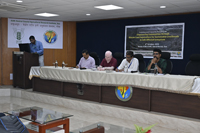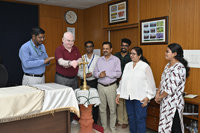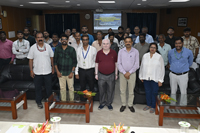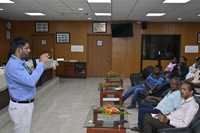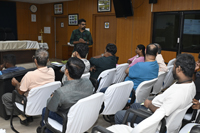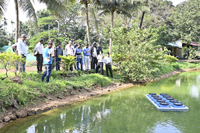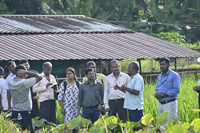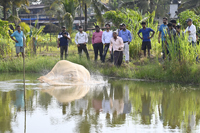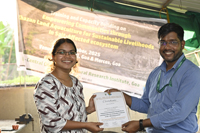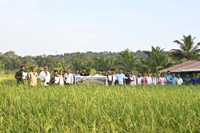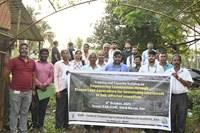
ICAR-CCARI Organizes Capacity Building Programme on Empowering Communities through Khazan Land Aquaculture for Sustainable Livelihoods in Salt-Affected Ecosystems of Goa
ICAR-CCARI Organizes Capacity Building Programme on Empowering Communities through Khazan Land Aquaculture for Sustainable Livelihoods in Salt-Affected Ecosystems of Goa
ICAR-Central Coastal Agricultural Research Institute (ICAR-CCARI), Goa organized a one-day Training and Capacity Building Programme on “Empowering Communities through Khazan Land Aquaculture for Sustainable Livelihoods in Salt-Affected Ecosystems” on 8th October 2025 under the NABARD funded project titled “Evaluating the Performance of Multispecies Finfish Culture in Small Low-Cost Ponds for Improving the Livelihood of Farmers in the Salt-Affected Coastal Saline Region of Goa”. Goa’s nearly 18,000 hectares of Khazan lands, traditionally managed as agro-aqua-forestry systems comprising paddy fields and salt pans, are increasingly threatened by soil acidity, salinity intrusion, and declining productivity; in this background, the training programme was organized to build awareness and capacity among farmers, students, and stakeholders on fish based integrated farming systems for Goa’s traditional Khazan lands. A total of 20 participants from different locations across Goa, including fish farmers, agricultural farmers, students, and farming enthusiasts, actively took part in the training. The programme commenced with a welcome address by Shri Trivesh Mayekar, Scientist (FGB), ICAR-CCARI, Goa, who introduced the objectives and importance of the training. Dr. N. H. Kelawala, Vice Chancellor, Kamdhenu University, Gandhinagar, Gujarat, graced the occasion as Chief Guest and appreciated ICAR-CCARI’s initiatives in promoting sustainable aquaculture in coastal regions. Dr. Parveen Kumar, Director, ICAR-CCARI, Goa, delivered the inaugural address, emphasizing the significance of Khazan ecosystems as traditional agro-aqua-forestry systems and the institute’s efforts toward promoting sustainable livelihood options in saline-affected coastal regions. Shri Rupesh Bhamaikar, DDM, NABARD, Goa, graced the occasion as the Guest of Honour and highlighted NABARD’s initiatives in supporting sustainable aquaculture and community-based livelihood projects in coastal areas. The technical sessions covered multiple aspects of Khazan-based aquaculture and integrated farming practices. Shri Trivesh Mayekar delivered lectures on “Candidate Fish and Shellfish Species for Aquaculture in Goa” and “Introduction to Khazan Ecosystem”, focusing on suitable species diversification and ecological perspectives of Khazan land aquaculture. Dr. Sreekanth G. B., Senior Scientist (FRM), presented a session on “Integrated Aquaculture Systems in Khazan Lands”, discussing the benefits of combining aquaculture with agriculture and livestock to enhance productivity and resilience. Dr Sujeet Desai, Scientist (Land and Water Management Engineering) explained the “Importance of Land Shaping in Khazan-based Rice, Fodder, and Vegetable Culture”, demonstrating how proper land and water management contribute to the success of integrated farming systems.
Following the technical lectures, participants were taken to the institute’s fish farm, where they observed ongoing activities including the innovative floating crab-barrel culture system, developed as part of adaptive aquaculture models for Khazan areas. The field demonstrations were held at the Khazan land farm at Merces, Goa where Mr. Joaquim D’Souza, a progressive farmer collaborating with ICAR-CCARI under the project shared his practical experiences, management strategies, and challenges encountered during implementation, and personally guided the participants on a tour of his farm. During this session, practical demonstrations were conducted. Mr. Harshvardhan Shetye, Young Professional (Fisheries Science), led a hands-on demonstration on fish stocking, pond management, feeding, and water quality monitoring, while Mr. Manish Patel demonstrated soil and water sample assessment techniques for agriculture. The programme also featured Farmers’ Experience Sharing and Farmer–Scientist Interaction sessions, which provided opportunities for mutual learning and feedback. The participants appreciated the technical sessions, hands-on exposure and practical demonstrations provided during the training. The event was coordinated by Shri Trivesh Mayekar, Scientist (FGB), Dr. Sreekanth G. B., Senior Scientist (FRM); Mr. Vishwajeet Prajapati, Technical Officer; Mr. Manish Patel, Technician (NRM); Mr. Harshvardhan Shetye and Mr. Mrudul Pendurkar, Young Professionals. The programme was aimed towards improving food security, production, livelihoods, and environmental services through the sustainable utilization and management of Goa’s unique Khazan land ecosystems.
